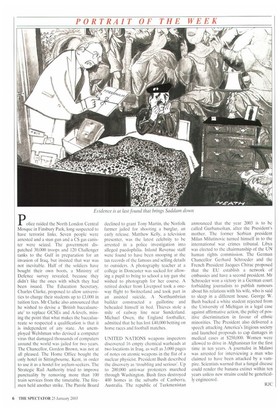P olice raided the North London Central Mosque in Finsbury Park,
long suspected to have terrorist links. Seven people were arrested and a stun gun and a CS gas canister were seized. The government dispatched 30,000 troops and 120 Challenger tanks to the Gulf in preparation for an invasion of Iraq, but insisted that war was not inevitable. Half of the soldiers have bought their own boots, a Ministry of Defence survey revealed, because they didn't like the ones with which they had been issued. The Education Secretary, Charles Clarke, proposed to allow universities to charge their students up to £3,000 in tuition fees. Mr Clarke also announced that he wished to devise a 'British baccalaureate' to replace GCSEs and A-levels, missing the point that what makes the baccalaureate so respected a qualification is that it is independent of any state. An unemployed Welshman who devised a computer virus that damaged thousands of computers around the world was jailed for two years. The Chancellor, Gordon Brown, was not at all pleased. The Home Office bought the only hotel in Sittingbourne, Kent, in order to use it as a hostel for asylum-seekers. The Strategic Rail Authority tried to improve punctuality by removing more than 100 train services from the timetable. The firemen held another strike. The Parole Board
declined to grant Tony Martin. the Norfolk farmer jailed for shooting a burglar, an early release. Matthew Kelly, a television presenter, was the latest celebrity to be arrested in a police investigation into alleged paedophilia. Inland Revenue staff were found to have been snooping at the tax records of the famous and selling details to outsiders. A photography teacher at a college in Doncaster was sacked for allowing a pupil to bring to school a toy gun she wished to photograph for her course. A retired docker from Liverpool took a oneway flight to Switzerland and took part in an assisted suicide. A Northumbrian builder constructed a guillotine and beheaded himself in bed. Thieves stole a mile of railway line near Sunderland. Michael Owen, the England footballer, admitted that he has lost £40,000 betting on horse races and football matches.
UNITED NATIONS weapons inspectors discovered 16 empty chemical warheads at two locations in Iraq, as well as 3,000 pages of notes on atomic weapons in the flat of a nuclear physicist. President Bush described the discovery as 'troubling and serious'. Up to 200,000 anti-war protesters marched through Washington. Bush fires destroyed 400 homes in the suburbs of Canberra, Australia. The republic of Turkmenistan announced that the year 2003 is to be called Gurbansoltan, after the President's mother. The former Serbian president Milan Milutinovic turned himself in to the international war crimes tribunal. Libya was elected to the chairmanship of the UN human rights commission. The German Chancellor Gerhard Schroeder and the French President Jacques Chirac proposed that the EU establish a network of embassies and have a second president. Mr Schroeder won a victory in a German court forbidding journalists to publish rumours about his relations with his wife, who is said to sleep in a different house. George W. Bush backed a white student rejected from the University of Michigan in a legal case against affirmative action, the policy of positive discrimination in favour of ethnic minorities. The President also delivered a speech attacking America's litigious society and launched proposals to cap damages in medical cases at $250,000. Women were allowed to drive in Afghanistan for the first time in ten years. A journalist in Malawi was arrested for interviewing a man who claimed to have been attacked by a vampire. Scientists warned that a fungal disease could render the banana extinct within ten years unless new strains could be genetically engineered.
RJC


















































































 Previous page
Previous page